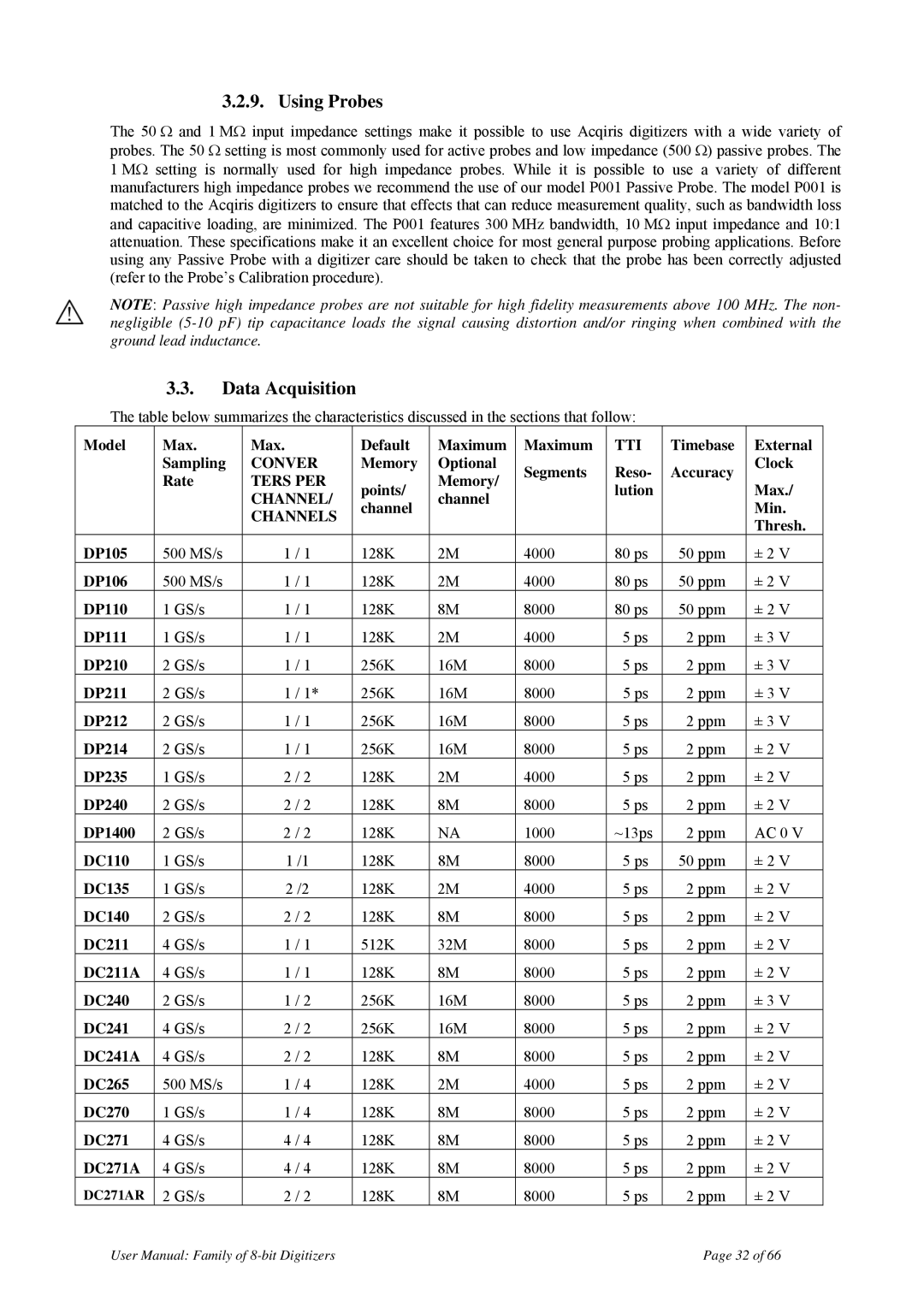3.2.9. Using Probes
The 50 Ω and 1 MΩ input impedance settings make it possible to use Acqiris digitizers with a wide variety of probes. The 50 Ω setting is most commonly used for active probes and low impedance (500 Ω) passive probes. The 1 MΩ setting is normally used for high impedance probes. While it is possible to use a variety of different manufacturers high impedance probes we recommend the use of our model P001 Passive Probe. The model P001 is matched to the Acqiris digitizers to ensure that effects that can reduce measurement quality, such as bandwidth loss and capacitive loading, are minimized. The P001 features 300 MHz bandwidth, 10 MΩ input impedance and 10:1 attenuation. These specifications make it an excellent choice for most general purpose probing applications. Before using any Passive Probe with a digitizer care should be taken to check that the probe has been correctly adjusted (refer to the Probe’s Calibration procedure).
NOTE: Passive high impedance probes are not suitable for high fidelity measurements above 100 MHz. The non- negligible
3.3.Data Acquisition
The table below summarizes the characteristics discussed in the sections that follow:
Model | Max. | Max. |
| Default | Maximum | Maximum | TTI | Timebase | External |
| Sampling | CONVER | Memory | Optional | Segments | Reso- | Accuracy | Clock | |
| Rate | TERS PER | points/ | Memory/ | Max./ | ||||
|
| lution |
| ||||||
|
| CHANNEL/ | channel |
|
| ||||
|
| channel |
|
|
| Min. | |||
|
| CHANNELS |
|
|
|
| |||
|
|
|
|
|
|
| Thresh. | ||
|
|
|
|
|
|
|
|
| |
DP105 | 500 MS/s | 1 | / 1 | 128K | 2M | 4000 | 80 ps | 50 ppm | ± 2 V |
DP106 | 500 MS/s | 1 | / 1 | 128K | 2M | 4000 | 80 ps | 50 ppm | ± 2 V |
DP110 | 1 GS/s | 1 | / 1 | 128K | 8M | 8000 | 80 ps | 50 ppm | ± 2 V |
DP111 | 1 GS/s | 1 | / 1 | 128K | 2M | 4000 | 5 ps | 2 ppm | ± 3 V |
DP210 | 2 GS/s | 1 | / 1 | 256K | 16M | 8000 | 5 ps | 2 ppm | ± 3 V |
DP211 | 2 GS/s | 1 | / 1* | 256K | 16M | 8000 | 5 ps | 2 ppm | ± 3 V |
DP212 | 2 GS/s | 1 | / 1 | 256K | 16M | 8000 | 5 ps | 2 ppm | ± 3 V |
DP214 | 2 GS/s | 1 | / 1 | 256K | 16M | 8000 | 5 ps | 2 ppm | ± 2 V |
DP235 | 1 GS/s | 2 | / 2 | 128K | 2M | 4000 | 5 ps | 2 ppm | ± 2 V |
DP240 | 2 GS/s | 2 | / 2 | 128K | 8M | 8000 | 5 ps | 2 ppm | ± 2 V |
DP1400 | 2 GS/s | 2 | / 2 | 128K | NA | 1000 | ~13ps | 2 ppm | AC 0 V |
DC110 | 1 GS/s | 1 /1 | 128K | 8M | 8000 | 5 ps | 50 ppm | ± 2 V | |
DC135 | 1 GS/s | 2 /2 | 128K | 2M | 4000 | 5 ps | 2 ppm | ± 2 V | |
DC140 | 2 GS/s | 2 | / 2 | 128K | 8M | 8000 | 5 ps | 2 ppm | ± 2 V |
DC211 | 4 GS/s | 1 | / 1 | 512K | 32M | 8000 | 5 ps | 2 ppm | ± 2 V |
DC211A | 4 GS/s | 1 | / 1 | 128K | 8M | 8000 | 5 ps | 2 ppm | ± 2 V |
DC240 | 2 GS/s | 1 | / 2 | 256K | 16M | 8000 | 5 ps | 2 ppm | ± 3 V |
DC241 | 4 GS/s | 2 | / 2 | 256K | 16M | 8000 | 5 ps | 2 ppm | ± 2 V |
DC241A | 4 GS/s | 2 | / 2 | 128K | 8M | 8000 | 5 ps | 2 ppm | ± 2 V |
DC265 | 500 MS/s | 1 | / 4 | 128K | 2M | 4000 | 5 ps | 2 ppm | ± 2 V |
DC270 | 1 GS/s | 1 | / 4 | 128K | 8M | 8000 | 5 ps | 2 ppm | ± 2 V |
DC271 | 4 GS/s | 4 | / 4 | 128K | 8M | 8000 | 5 ps | 2 ppm | ± 2 V |
DC271A | 4 GS/s | 4 | / 4 | 128K | 8M | 8000 | 5 ps | 2 ppm | ± 2 V |
DC271AR | 2 GS/s | 2 | / 2 | 128K | 8M | 8000 | 5 ps | 2 ppm | ± 2 V |
User Manual: Family of |
|
|
|
| Page 32 of 66 | ||||
